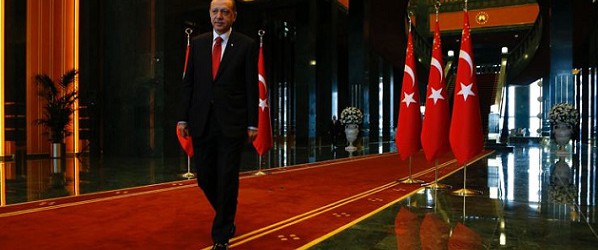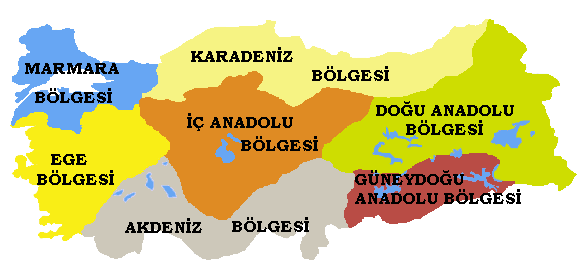General elections that will take place in Turkey in June 2015 will be very critical not only because there is no pre-scheduled elections until 2019, but also it can create a very comfortable ground for changing the political regime of the country. In this short article, I will try to question the possibility of a Presidential system based on federalism in Turkey.
Turkish President of the Republic Mr. Recep Tayyip Erdoğan (12th President of the Republic, but the first one to be elected by people’s votes directly) is known to be a strong advocate of Presidential system. However, until now, -except for 2002-2007 period- his party (JDP) was not able to control 2/3 majority in the Turkish Parliament (Turkish Grand National Assembly – TGNA) and to change the constitution by itself. But now, two recent political developments in Turkey might help Erdoğan and his party (now ruled by Prime Minister Ahmet Davutoğlu) to have 2/3 majority in the next elections.
The first one is related to pro-Kurdish People’s Democracy Party’s (PDP) decision to enter into election as a political party instead of independent candidates (as they did several times before), although 10 % electoral treshold in Turkey is still not lowered down or removed. This might be understood as an act of self-confidence on the side of the Kurdish nationalists, however, if they fail to pass % 10 treshold (which seems very probable), JDP’s number of seats coming from south-eastern Anatolia will be doubled. JDP already has 312 seats in the parliament and with PDP out, they will get around 340-345 seats easily.
The second important political development in Turkey is related to the establishment of a new political party by former Republican People’s Party (RPP) parliamentarian and charismatic female lawyer Emine Ülker Tarhan called Anatolian Party (AP). Although recently established, AP could get a few percent of the votes and could reduce the parliamentary seats of both RPP and Nationalist Action Party (NAP) in the next elections. Thus, if JDP could garner around 52 % of the votes in June 2015 in addition to these two developments, JDP might control 2/3 of the TGNA and could make constitutional changes without any problem in order to embrace a new political system based on Presidentialism and federalism. The biggest problem for JDP however, is its recent political rivalry with Fethullah Gülen community, whose members and sympathizers will support RPP or NAP in the next election.
Here it might be appropriate to talk about chances of Presidentialism and federalism in Turkey. Unfortunately, in Turkey this topic is seen as a political taboo mostly because of fears against Islamist rightist parties’ dominance in the political spectrum which could be worsened with a Presidential system based on SMDP (majority) voting. However, in fact, in a carefully designed Presidential system with all check and balance mechanisms similar to USA, secular democratic nature of the Turkish political system might be better protected. Here RPP, pro-European and pro-secular social democratic party coming from Kemalist tradition, is affraid of never coming to power with such a system since they know that the party’s natural electoral boundary is maximum around 30 %. Same for Turkish nationalist NAP, whose natural electoral boundary is limited to 20 %. However, in a Presidential system, these two parties could engage in unification process or at least in an electoral coalition similar to what they did in the last Presidential elections, by showing previous secretary-general of Organization of Islamic Cooperation (OIC) Prof. Ekmeleddin İhsanoğlu as their common candidate and got around 40 %, a record for RPP since Bülent Ecevit’s miraculous result of % 41 in 1977 elections. A republican left-nationalist right coalition similar to Republican Party in the US might work very well for these two parties in a Presidential system if they could come up with charismatic and refined candidates similar to Mr. İhsanoğlu.
Turkey’s 7 geographical zones
Another prejudice towards Presidential system in Turkey is related to federalism which automatically brings fears about Kurdish secessionism in the country which led to the death of 35.000 Turkish citizens over the last 30 years because of the PKK terrorism. However, if the federal status of the state could be guaranteed and finalized in the constitution, with a strong political support given to the state by Kurdish nationalists, this might in fact weaken Kurdish secessionism instead empowering it. Here, one should not forget that Turkish state already divided the country into 7 geographical zones which might be used as a perfect basis to create 7 states (eyalet) within the federal Turkish state. In terms security and foreign policy issues, if these states are strongly tied to the central authority in Ankara, their local parliament will not harm anybody in the country and will not create any anxities towards secessionism.
Another advantage of the federal system would be the possible annexation of some disputed territories such as the TRNC (Turkish Republic of Northern Cyprus) with democratic referendums as the 8th state of the country. This might even include some parts of Syria and Iraq mostly populated by Kurds and Turcomans (e.g. Kurdistan Regional Government in Northern Iraq) who might be easily convinced that becoming a part (state) of Turkey will be much better for them in terms of security issues and economic advantages. By doing this, Turkey might even reduce its energy dependency on other countries, primarily on Russian Federation.
As it can be seen, transition to Presidential system based on federalism is not impossible or a nightmare for Turkey. For sure, it might be still more preferable for Turkey to keep its state tradition based on parlamentarism (which started first in 1876 in the Ottoman State), but if the change is inevitable, it might be better for Turkey not to lose too much time with the old system and embrace the new one as soon as possible.
Dr. Ozan ÖRMECİ


























































